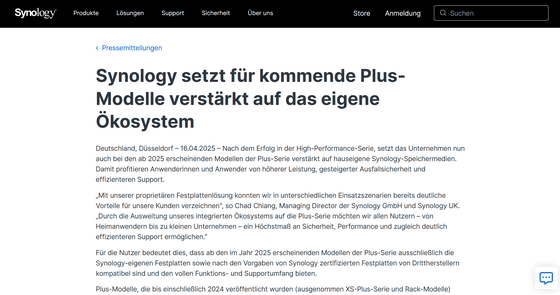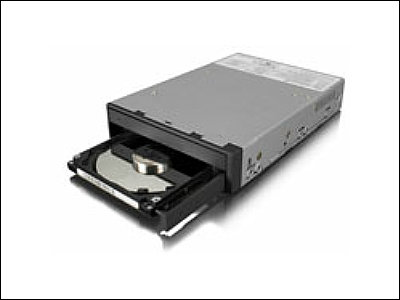Synology NAS devices are restricting the use of drives other than those approved by the company

Synology has announced a policy to restrict the use of HDDs (hard disk drives) other than those manufactured by Synology or certified by Synology in the 'Plus Series' NAS models released after 2025. This new policy will be extended to products aimed at individuals and small businesses, based on the success of the enterprise models already introduced.
Synology Inc.

Festplatten-Zwang: Synology weitet Nutzung auf Plus-Modelle aus - Hardwareluxx
https://www.hardwareluxx.de/index.php/news/hardware/festplatten/65949-synology-weitet-den-zwang-zur-eignen-oder-zertifizierten-festplatte-auf-die-plus-modelle-aus.html
Synology could bring “certified drive” requirements to more NAS devices - Ars Technica
https://arstechnica.com/gadgets/2025/04/synology-could-bring-certified-drive-requirements-to-more-nas-devices/
Synology's German subsidiary has announced a policy to impose restrictions on the use of non-genuine Synology HDDs in its 'Plus Series' NAS products released after 2025. This change means that the use of non-genuine HDDs will disable advanced features such as deduplication, drive lifespan analysis, and automatic firmware updates, and may even limit the ability to create storage pools. Furthermore, this could mean that customers may no longer be able to receive official Synology support if a problem occurs. Therefore, the use of genuine or certified HDDs is now strongly recommended.

Synology's genuine HDDs are based on Toshiba and Seagate products and feature proprietary firmware. One of their strengths is that the firmware can be updated while connected to the NAS, allowing maintenance to be performed without using an external PC.
Certified HDDs are HDDs whose compatibility has been officially verified by Synology and are fully supported just like genuine HDDs. However, according to Synology, 'features such as deduplication, lifespan analysis, and automatic firmware updates are only available on genuine HDDs.'
On the other hand, if you use a 'non-certified HDD' that Synology has not verified for compatibility, not only will it be ineligible for support, but the drive's health status estimate will also be invalid, increasing the management burden on the user. However, this restriction will only be introduced on new models released from 2025 onwards, and will not affect Plus series models released before 2024. Also, when migrating HDDs from older models, existing drives will be usable on new models without any restrictions.

The background to this specification change is Synology's shift to an 'integrated ecosystem.' Synology has previously implemented a similar policy for its enterprise-oriented XS Plus series and rackmount models, which have proven to provide high stability and improved support quality. Synology claims that by optimizing the hardware, software, and even drives in-house, it can improve the performance and security of the entire NAS. By expanding this to the Plus series, the company hopes to provide a safe and efficient environment for a wider range of users.
These changes have polarized user reactions. While they are welcomed by those who prioritize enterprise reliability and security, there have been criticisms from home users who prioritize DIY and cost-effectiveness, stating that Synology has sacrificed its existing flexibility in an effort to lock in their customers. For individual users considering lower-priced Plus models, such as the DiskStation DS224+ , configuring with genuine Synology drives can be a price burden.
According to IT news site Ars Technica, some technically savvy users have found ways to bypass the authentication check by editing the NAS's internal configuration files. However, this is obviously an unrecommended practice with no official guarantee, and Synology may take measures to block it in the future. This announcement was made by Synology's German subsidiary, but it is not clear at this time whether these restrictions will be applied only to Germany and the EU region, or globally.
・Continued
Synology releases 'NAS that limits storage from other companies', but the overwhelming majority of users online say 'switch from Synology to other companies' NAS' - GIGAZINE

Related Posts:
in Hardware, Posted by log1i_yk






